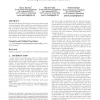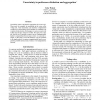13457 search results - page 16 / 2692 » Can we elect if we cannot compare |
JCS
2011
13 years 2 months ago
2011
One of the main challenges in pervasive computing is how we can establish secure communication over an untrusted high-bandwidth network without any initial knowledge or a Public K...
MST
2007
13 years 7 months ago
2007
Consider a collection of r identical asynchronous mobile agents dispersed on an arbitrary anonymous network of size n. The agents all execute the same protocol and move from node ...
PODC
1999
ACM
13 years 11 months ago
1999
ACM
We study the memory requirements of self-stabilizing leader election (SSLE) protocols. We are mainly interested in two types of systems: anonymous systems and id-based systems. We...
SAC
2009
ACM
14 years 5 days ago
2009
ACM
Experimental studies have shown that electing a leader based on measurements of the underlying communication network can be beneficial. We use this approach to study the problem ...
AAAI
2007
13 years 9 months ago
2007
Uncertainty arises in preference aggregation in several ways. There may, for example, be uncertainty in the votes or the voting rule. Such uncertainty can introduce computational ...


